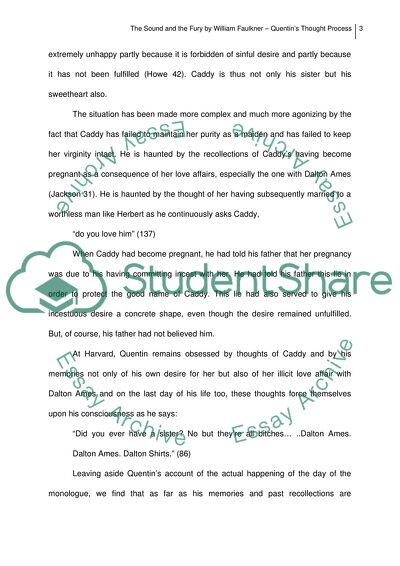
- Home
- Free Samples
- Premium Essays
- Editing Services
- Extra Tools
- Essay Writing Help
- About Us
- Studentshare
- Subjects
- Miscellaneous
- The Sound and the Fury by William Faulkner Quentins Thought Process
The Sound and the Fury by William Faulkner Quentins Thought Process - Essay Example

- Subject: Miscellaneous
- Type: Essay
- Level: Masters
- Pages: 4 (1000 words)
- Downloads: 0
- Author: melissa69
Extract of sample "The Sound and the Fury by William Faulkner Quentins Thought Process"
Caddy is not given any monologue but she is portrayed by means of other characters. Faulkner portrays Caddy in Quentin’s monologue as a promiscuous girl, who has been involved in different love affairs after entering the teenage (Howe 62). This quote is a part of Quentin’s monologue because it describes about Quentin’s incestuous desire related to Caddy. From the second monologue, we learn that Caddy has been dominating the thoughts of her elder brother Quentin also, and that she still dominates his thinking (on the day of the monologue).
They have not committed incest, it is just Quentin’s lie. The central fact of Quentin’s existence is his incestuous desire for his sister Caddy, a desire, which has remained unfulfilled. This incestuous desire makes extremely unhappy partly because it is forbidden of sinful desire and partly because it has not been fulfilled (Howe 42). Caddy is thus not only his sister but his sweetheart also. The situation has been made more complex and much more agonizing by the fact that Caddy has failed to maintain her purity as a maiden and has failed to keep her virginity intact.
He is haunted by the recollections of Caddy’s having become pregnant as a consequence of her love affairs, especially the one with Dalton Ames (Jackson 31). He is haunted by the thought of her having subsequently married to a worthless man like Herbert as he continuously asks Caddy, When Caddy had become pregnant, he had told his father that her pregnancy was due to his having committing incest with her. He had told his father this lie in order to protect the good name of Caddy. This lie had also served to give his incestuous desire a concrete shape, even though the desire remained unfulfilled.
But, of course, his father had not believed him. At Harvard, Quentin remains obsessed by thoughts of Caddy and by his memories not only of his own desire for her but also of her illicit love affair with Dalton Ames and on the last day of his life
...Download file to see next pages Read More
- TERMS & CONDITIONS
- PRIVACY POLICY
- COOKIES POLICY